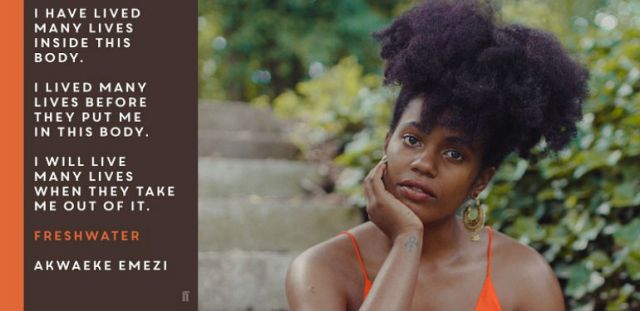Akwaeke Emezi was born in 1987 in in Umuahia, Nigeria and studied at New York University. In 2017, they won the Commonwealth Short Story Prize for Africa. Emezi’s debut novel Freshwater was published one year later. Their latest novel The Death of Vivek Oji was published in 2020 in the U.S.

The New York-based author of Igbo Tamil descent, who also describes themselves as a „nonbinary trans and plural person“ explained in several interviews (e.g. Deutschlandfunk Kultur) that many elements of the novel are of autobiographical origin. Freshwater tells the story of a „plural individual“ – a transgender person called Ada whose body is inhabited by several personalities and occupied by various spirit beings from Igbo mythology.
The novel combines themes of gender, sexual violence, mental health, trauma, physicality and identity with elements of Igbo culture, specifically the Ogbanje. Ogbanje are evil spirits, the literal translation from the Igbo language is „children who come and go“. The Ogbanje picks a family and enters the body of one child to kill him or her before puberty. After the Ogbanje is done with that child, it returns to the same family to be reborn and the cycle repeats itself. Dr. Sunday Ilechukwu states in her article „Ogbanje/abiku and cultural conceptualizations of psychopathology in Nigeria“ that Ogbanjes choose predominantly female children. Furthermore she explains the suffering of Ogbanje children: „The most common psychiatric symptoms are visual hallucinations […], aggressive/destructive behavior […], conversion/dissociation disorders […], and vivid dreams about water […]The loss of control, unexplained symptoms (conversion), changes in conscious expression (dissociation), and dreams about water […] and play (with spiritual companions) suggest Ogbanje to the patients“. The aspect of water is, of course, particularly interesting in relation to the title of the novel.
In the Nigerian context, the phenomenon of Ogbanje is well known, Ogbanje is also used in speech as a synonym for stubborn children. Ogbanje are also a recurring literature motif from Nigeria and from the Nigerian Diaspora. One of the most known examples for this is the character Ezinma in Chinua Achebe’s Things Fall Apart.
Ada is one of those Ogbanje children. She is the daughter of a Nigerian doctor named Saul and his Malaysian wife, Saachi. From a young age, it is clear that Ada is different from the others which shows for example in self-injurious behavior. While most Ogbanjes die as children, Ada survives. But things get worse the older she gets. When Ada moves to the U.S. at 16 to go to college in Virginia, the Ogbanje’s voice grows stronger. Ada gets raped on her campus and the Ogbanje splits into many entities as a result. One entity named Asughara is especially powerful and dangerous. Asughara is a female spirit that wants to avenge Ada, but destroys her in doing so. There are times when Ada gives complete control over to that raging spirit. Asughara is a violent force, ruthlessly seeking sexual encounters, destroying Ada’s relationships in the process. She uses Ada’s body to seduce and to break men, but also to harm Ada. She cuts and hurts herself in many other ways, from unprotected casual sex, to excessive drinking and disordered eating. Ada tries to oppose Asughara, which almost ends in suicide, but she manages to get rid of her.
Ada goes through many relationships, some of them are intense or even traumatic, some are just fleeting and weak in meaning. However, Ada’s most intense relationships are not with other people, but with the voices inside her that contradict each other, take her over and tear her apart. Ada also carries a male entity within herself, this one is named Saint Vincent, which in contrast to Asughara is full of gentleness and makes her date women and explore her queer identity. She experiences gender dysphoria and tries to find ways to deal with it first by binding her chest and eventually by having surgery to reduce the size of her breasts.
Freshwater deals a lot with embodiments. Ada struggles with being in her body and with the trauma that is linked to this body, as well as with the entities living within her. Freshwater is about being trapped in a body, but the multiple personalities also enable a complexity and open up new perspectives.
By presenting the Ogbanje as reality in their novel, Emezi pays tribute to the elements of Igbo culture and develops the literary motives even further. With the colonization of Nigeria, much of the Igbo culture was lost, suppressed and discarded. With Freshwater, the author shows us a small insight into the multifaceted Igbo culture, but mixes this with modern twists. The novel blurs the lines between Igbo gods, mental illnesses and gender issues.
These themes are certainly not easy, but the narrative style that conveys them is outstandingly poetic and stylistically so powerful that it keeps the reader hooked. Freshwater is characterized by a thrilling narrative style, switching from the collective Ogbanje who refer to themselves as “We” to Ada herself, who barely narrates her own story, to the spirit Asughara. The alternating switching between characters and voices can first be irritating for the reader but it’s also one of the main points why the novel is so captivating.
After prize-longlisted Freshwater was praised by both critics and by the public on an international scale, Emezi is following up with a second novel called The Death of Vivek Oji. This new novel shares Freshwater’s themes, particularly in its exploration of ideas of selfhood, identity and embodiment, along with spirituality.
About the author:
Elena Schaetz is a student of African Studies (MA) at the Humboldt University of Berlin. Her research focuses on literature, culture, gender and queerness in South African regions.


